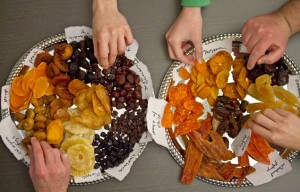Ridiculously Delicious Challenge Update: Sorry that we delayed and then delayed again. I am still reeling from 70 hour weeks in December. Trying to get all those brain cells firing again and I am struggling to motivate. We ARE working on it though. Expect an announcement this week.
Whether or not to be paternalistic with food choices? I am constantly conflicted regarding whether we should take a tough position on what we do and don’t sell. I know that we aren’t going to ever sell the worst of the worst. For example, I have my brother and father in my ear almost weekly about how we can make boatloads of money selling foie gras. I agree with them, but I don’t give a fuck. Foie is on my dirty dozen list. A much more difficult question is whether we should sell the duck legs and breasts that are a by-product of foie production. Still undecided on that one.
One thing is certain: that we write our product descriptions to give as much information about the product as possible, regardless of, for example, whether it pisses off one of our truffle oil producers that we state that their product may contain petroleum flavoring extracts. And, we use the word “may” because the truffle product industry is as non-transaparent as possible, so we really don’t know.
In the office, I often state that “I reserve the right to contradict myself” on many matters … product selections being one of them. This week we got in a few dozen varieties of dried fruit samples, most of which we’ll be adding to the store in bulk. Among the many fruits was both a natural dried papaya (ingredients: papaya) and a more conventional dried papaya (ingredients: papaya, sugar, sulfur dioxide, FD&C yellow #5 and #6). Obviously, we are adding the former. But, some people might actually want the latter because it’s color is vibrant orange or because it is less expensive. (natural on the left, other on the right)
My instinct is to just sell the natural papaya … but is that too big brotherish? Does disclosing the ingredients (which we always try to do) go far enough? Or, should we simply avoid the non-natural papaya?
It was definitely a fun way to wrap up a Friday … a bottle of champagne and tasting a few dozen dried fruits, including some really interesting varieties like cantaloupe, persimmon, etc.



You know your customers. Will the existence of the unnatural version drive some customers away? Will someone stumbling upon that one decide that it says something about your product choices as a whole?
I love dried persimmons, btw. Amazing fruit.
You can’t sell everything. If I owned a food-related store, I’m pretty sure I’d WANT to sell only the things that I personally felt were valuable and useful and top quality and everything else that I look for when I buy something for me. If customers came in and started asking for gadgets that I thought were stupid, I’d probably resist at first. But if enough people asked, I’d probably relent. Because I’d want to please the customers. I don’t think I’d endorse the item, but I’d say, “A lot of people asked for them and they like them, but I don’t personally,use one…” I’d just be honest about it and let it go at that.
I don’t think it’s big-brotherish to sell what you want to sell. On the other hand, I don’t think there’s anything wrong with offering the choice and giving full disclosure. Of course, it also depends on whether that conventional dried papaya is any different from what’s sold in grocery stores. If it’s better quality than that product, then maybe you should consider it. If it’s readily available elsewhere, them maybe there’s no need for you to have it.
To borrow a line from Shakespeare… “To thine ownself be true.” Let’s face it. People buy things, according to their preferences. If they trust you to sell foods as safe and natural as possible, then you should maintain that trust. The foie gras issue is one of values. Whatever you decide…be as consistent as you can with your values and morals. You’ll never lose completely if you are. At the very least, you won’t hate the guy you meet in the mirror every morning!